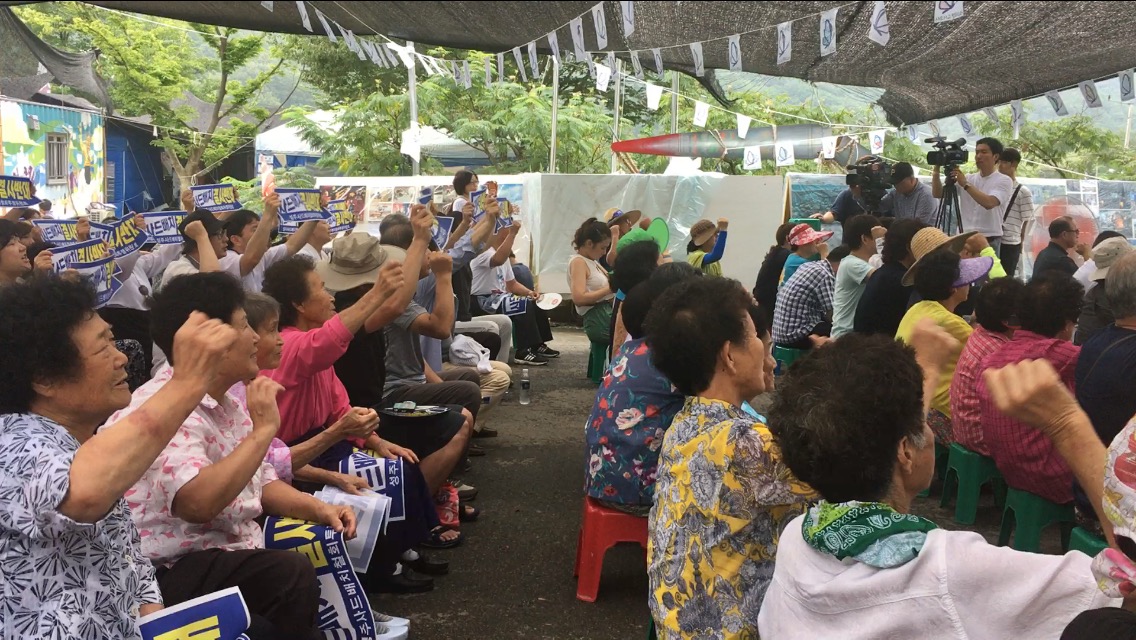Stop THAAD!

Written by Peter Gallo
Photographs courtesy of STOPTHAAD.org
I’m tired of hearing about the North Korean missile crisis, too. But who is the real aggressor? Anti-war action groups say that it is the U.S. and that the deployment of the THAAD (Terminal High Altitude Area Defense) missile defense system along with the U.S.-South Korea war games are what’s driving the confrontation.
A U.S. Peace-Solidarity Delegation led by some colorful, if controversial, figures visited South Korea at the end of July. They have brought some much-needed attention to the grassroots-led “Stop THAAD” movement here in South Korea, as well as a “Yes to Peace Through Dialogue” solution to the crisis. The delegates included Jill Stein (former Green Party presidential candidate during the 2016 U.S. election), Medea Benjamin (CODEPINK), Reece Chenault (U.S. Labor Against War), and Will Griffin (Veterans for Peace). These delegates represent the Task Force to Stop THAAD in Korea and Militarism in Asia and the Pacific, which calls for the removal of the U.S. THAAD missile defense system from South Korea… but there are additional demands. For example: an end to the U.S.-South Korea War Games in exchange for a freeze of North Korea’s nuclear weapons and missile programs, the replacement of the Korean War armistice with a peace treaty, and the peaceful reunification of Korea. These are ambitious but very relevant goals, I would argue. The delegation has shared its message of solidarity with villagers of Seongju, Soseong-ri, and Gimcheon, where the THAAD interceptors are deployed, and also with a broad spectrum of peace activists in Seoul.
The coordinator of the delegation, Juyeon Rhee, who is Korean-American, was blocked from traveling with the delegation by South Korea. Supporters are urged to join a petition to reverse this, and it seems likely that the Moon administration will. During their July 22–28 stay, the delegation met with women opposed to the THAAD system deployed in their communities. Delegates also attended rallies and have even met with the South Korean chair of the National Assembly Committee.
To help get the perspective of the local activists about these happenings, I spoke to a researcher (who wishes to remain anonymous for security reasons) who recently spent three weeks in Seongju. Through this interview, I learned more about why so many people oppose THAAD. According to my source, the delegation’s two-night stay in Seongju included a day that overlapped with a larger anti-THAAD protest in Seosong-ri. Members of the delegation were able to talk with villagers, my source tells me, thanks in great part to two “very competent translators that are peace activists in their own right.”
So, what are some of the actual arguments against THAAD that are being expressed by the activists? The THAAD researcher I interviewed had this to say:
Given the reality of North Korea’s ongoing missile testing, the need to deploy THAAD as a defensive technology would seem obvious, but what I learned during my stay in Seongju was that, for the people who oppose the system, THAAD is an issue of undemocratic politics. [There is a] critical lack of transparency surrounding the deployment under Park, and now under Moon. Following the opinion of various experts, they view the technology as essentially useless to defend South Korea and see it as a symbol of how the South Korean government yields too easily to U.S. pressures while inflaming tensions with the North. They are also concerned about the health and environmental impacts of the system’s powerful radar, and they are concerned about their area becoming a target for future military actions by the North.
According to stopthaad.org, there have been demonstrators at the proposed site every day since the deployment was announced, last year. Let’s support them by joining in saying “Stop THAAD.” As for the delegates, I’m not going to argue that they are perfectly suited for the kind of leadership needed right now, but they have managed to get over 270 individuals of significance and nearly 90 organizations to sign on to the demands of the Task Force. I’m also aware that, put into practice, these proposals would eventually radically transform the Korean Peninsula as we know it. Take a look at the list of supporters for yourself and consider joining them.
To view the solidarity statement, and an impressive list of its supporters, search the stopthaad.org homepage for “No to THAAD in Korea, Yes to Peace through Dialogue.”
The Author
Peter Gallo regularly contributes to the Gwangju News and is documenting his life in Korea at anjeongchingu.com, and also shares his writings with the Facebook group with the same name.
As is always true of our Op-Ed pieces, the opinions expressed in this article are those of the author and do not necessarily reflect the views of the Gwangju News, the GIC, or the Gwangju city government. — Eds.







